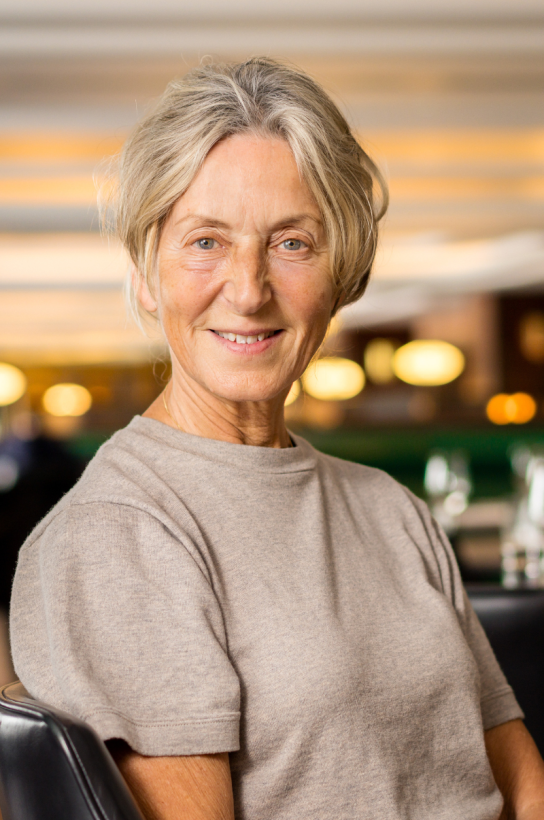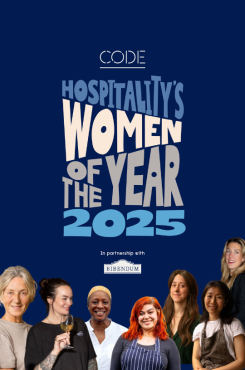CODE Hospitality’s Lifetime Achievement Award 2025 Dame Karen Jones
Published 31 March 2025
By Ben McCormack

Over a decades-long career, Dame Karen Jones has changed the face of hospitality on the high street. From Dome and Café Rouge in the 1980s, to Spirit Group in the early 2000s, and on to the present day and her roles at Deliveroo, Hawksmoor, Frontier Pubs, and Mowgli, Jones has never lost sight of what it’s all about and who it’s all for.
Dame Karen Jones might not be the first Dame I have ever met but she is certainly the first to offer to make me a cup of tea. But this sort of hands-on hospitality is only to be expected from a woman who has done more to change the way people dine out in the UK than most Michelin-starred chefs.
Hospitality might not be in Jones’s genes – her half-English, half-Welsh father worked on the British Railways board in York, her Swiss mother was a social worker – but it is certainly in her psyche. “I seem to possess the innate qualities you need to love hospitality,” Jones tells me. “One of those is that you have to like people. And another is a nurturing instinct, because I’ve always believed that the true test of any form of hospitality, whether it’s buying a cup of coffee or staying in a hotel, is that you should come out feeling better than when you went in.”
Jones’s first job before taking up a place to read English and American Literature at the University of East Anglia in the mid-Seventies was a gap year spent as a waitress at Bettys, the legendary York tearoom, where “they taught me everything about calmness and an absolutely genuine care of the customer”. More student jobs followed, including at Tatlers restaurant in Norwich – “a very good training, because everything was made by hand” – but it was the three months waitressing at Peppermint Park before embarking on a career in advertising that was her most formative experience.
I know lots of incredible hospitality leaders running companies whose first job was gathering glasses in a pub
The Covent Garden restaurant was an early eighties sensation that was the natural successor on the London restaurant scene to Langan’s Brasserie. It was launched in 1978 by accountant-turned-record producer Roger Myers and was, Jones says, “just fabulous – fabulous vibe and a fabulous troupe of waiting staff.” So fabulous, in fact, that after 18 months Jones turned her back on advertising to work full time at Peppermint Park in order to learn about restaurant management.
Jones and Myers took the company public as Theme Holdings PLC in 1985, which included Coconut Grove restaurant, the Dome café-bars and Peter Langan’s Bar and Grill, and sold it in 1988. When Jones told Myers she wanted to open the sort of neighbourhood brasserie she knew from France and Switzerland, he offered to be a silent partner.
The first Café Rouge opened in Richmond in 1989 and was, in Jones’s words, “an instant and huge success – we had to close it after a month to expand the kitchen”. Why does she think it struck such a chord? “I was just very sure about everything I was doing. There was a huge coffee machine, so it was clear that we were open all day. There was an open frontage, which I always think is incredibly inviting. Everything was made from scratch in the kitchen and there was a two-course prix fixe for five pounds which sold out every day.”
Café Rouge followed one of Jones’s fundamental business principles. “You have to be able to describe your enterprise in one sentence,” she explains. “Café Rouge was ‘value for money, fresh French food.’ I go on and on about this, but you need to have a phrase that comes from the founder of the business or the CEO and you should be saying it ten times a day. It’s the first thing that anybody on their first day at work should hear: this is what we are and this is what we believe in.”
I’ve always believed that the true test of any form of hospitality is that you should come out feeling better than when you went in
Jones couldn’t be any more delighted at receiving the Lifetime Achievement Award for CODE’s Women of the Year. “It really is a genuine honour, because it’s from the industry,” she says. After several decades in and around the hospitality industry, what lessons can she pass on? “If I could offer women one piece of advice, it would be to have confidence. Because then you’ll have a go at something you’ve never tried before and get up when you’ve been knocked down. For that, you need cheerleaders in your life. My mother was a very significant influence and my biggest cheerleader and I’ve always tried to be that for other people.”
Shortly after opening the Richmond Café Rouge and with two more in the pipeline, Jones discovered she was pregnant. She took her newborn daughter Rose with her everywhere, from solicitors’ offices to building sites. “My attitude was, I’m doing this enterprise which I really care about. So, I’m sorry, but if you want me to sign the papers, my baby’s coming with me.”
Jones says she can remember when she had each of her three children by the number of Café Rouge open at the time: one for Rose, 30 for Max, 70 for Molly. By the time she left what had become The Pelican Group PLC in 1998, bought two years earlier by Whitbread for £133 million, there were over 100 Café Rouges.
Jones went on to co-found the London gastropub group Food & Fuel Ltd, which was sold to The Restaurant Group in 2018, and was CEO of Punch Retail/Spirit Group from 2000 until its sale to Punch Taverns PLC for £2.7 billion in 2006. That year she was awarded a CBE for services to the hospitality industry; a DBE followed in 2022 for services to business and hospitality.
If I could offer women one piece of advice, it would be to have confidence. Because then you’ll have a go at something you’ve never tried before and get up when you’ve been knocked down
Now, among other roles – Jones is a non-executive director of both Whitbread PLC and Mowgli, a senior independent director at Deliveroo PLC, the chair of Hawksmoor Restaurant Group and Frontier Pubs as well as advising Punch Pubs Ltd – she is a commissioner of The Crown Estate, at whose St James’s HQ we are meeting. But Jones remains committed to championing the sector of hospitality she pioneered.
“The aim of mid-market restaurants is to serve great food at good prices to hard-working people in their communities. That offering has changed radically in the last few years because of cost pressures. I fear for the consequences of the national insurance and minimum wage increases in April because I know that not everyone is ready for it. That is a very concerning prospect for businesses that were already left cash-strapped after Covid.”
Jones co-chairs the Hospitality Sector Council with the Minister for Hospitality. What does she think the government can do to help the industry? “Politicians need convincing of the significant economic benefits of hospitality, not only from hospitality itself but for adjacent industries such as sporting and cultural events and tourism. Hospitality makes the experience whole, from a hot dog at the football to a meal after the theatre. So, we have a job to do to demonstrate the holistic benefits of hospitality, which gives so many people who leave school at sixteen their first job. I know lots of incredible hospitality leaders running companies whose first job was gathering glasses in a pub.” Or, like Jones, serving a cream tea at Bettys.
On the way out, Jones asks me if I have a coat and fetches it for me from the cloakroom before calling the lift and shaking my hand goodbye. Even a farewell from Dame Karen Jones feels like the warmest of welcomes.





